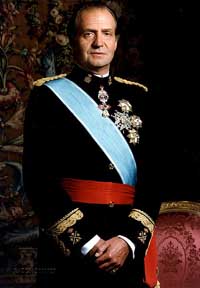Spain's king defends monarchy

Monarchy is a guarantor of stability, King Juan Carlos said, countering attacks from small groups of Catalan nationalists and a prominent right-wing commentator who has called on him to abdicate.
The king holds a largely figurehead position and rarely speaks out on political issues. So he raised many eyebrows Monday in a speech in the northern city of Oviedo when he publicly defended the role of the crown in Spanish society.
In a one-paragraph allusion to the current controversy in an otherwise nonpolitical speech, the king said the monarchy - restored in Spain in 1975 - "has provided the longest period of stability and prosperity that Spain has ever experienced under democratic rule."
At least three times in recent weeks, small groups of young protesters in the independence-minded Catalonia region have burned photographs of King Juan Carlos and Queen Sofia.
A Catalan pro-independence party called Republican Left of Catalonia last week called for the king to be stripped of his role as commander in chief of the Spanish armed forces.
And in recent weeks Federico Jimenez Losantos, an outspoken commentator on the conservative radio station COPE, has said the king should abdicate in favor of his son, Crown Prince Felipe, as a gesture of renewal in the monarchy.
COPE is owned by the Roman Catholic Church, which on Monday distanced itself from that appeal and said it supported the king.
Over the weekend, the vice president of the Spanish Bishops Conference, Archbishop Antonio Canizares, urged Catholics to pray for the king, whom he said "is being treated so badly, who is receiving so many in insults these days."
The king's remarks also came as Spain mulls an announcement from the president of the Basque country that he will unilaterally call a referendum on the region's future, presumably posing the question of whether Basques want to seek independence or remain part of Spain.
The government has called this unconstitutional because only it, not a region, can convene a referendum. The king seemed to address this issue as well, saying he wanted Spaniards to back the values of "democratic harmony, understanding, mutual respect, tolerance and freedom." He said the Spanish constitution of 1978 "upholds our parliamentary monarchy."
The Spanish government initially chose to downplay the photo-burnings of the royal couple as acts of a tiny minority, but last week went on the offensive in support of the king.
"The institution of the crown is consolidated, enjoys very good health health and this is the view of most citizens," Deputy Prime Minister Maria Teresa Fernandez de la Vega said Friday. "The attacks on the crown are useless and sterile."
After spending much of his life in exile, Juan Carlos was groomed by Gen. Francisco Franco to take power after the dictator's death. This coronation happened just days after Franco died in November 1975.
For many Spaniards the king is a deeply revered figure because of his role in putting down an attempted coup in 1981 by military officers nostalgic for right-wing rule.
Polls on Spaniards' support for the royal family are rare, but in one released in October 2006 the monarchy scored 5.1 on a scale of 1 to 10. This was considered a passing grade. No institution scored higher than 5.7. That was the police force.
Many commentators say Spaniards are more enthusiastic about the king himself than the actual monarchy and call themselves "juancarlistas" - supporters of Juan Carlos even though they may not be crazy about a system with a blue-blooded, unelected head of state in the 21st century.
Subscribe to Pravda.Ru Telegram channel, Facebook, RSS!


